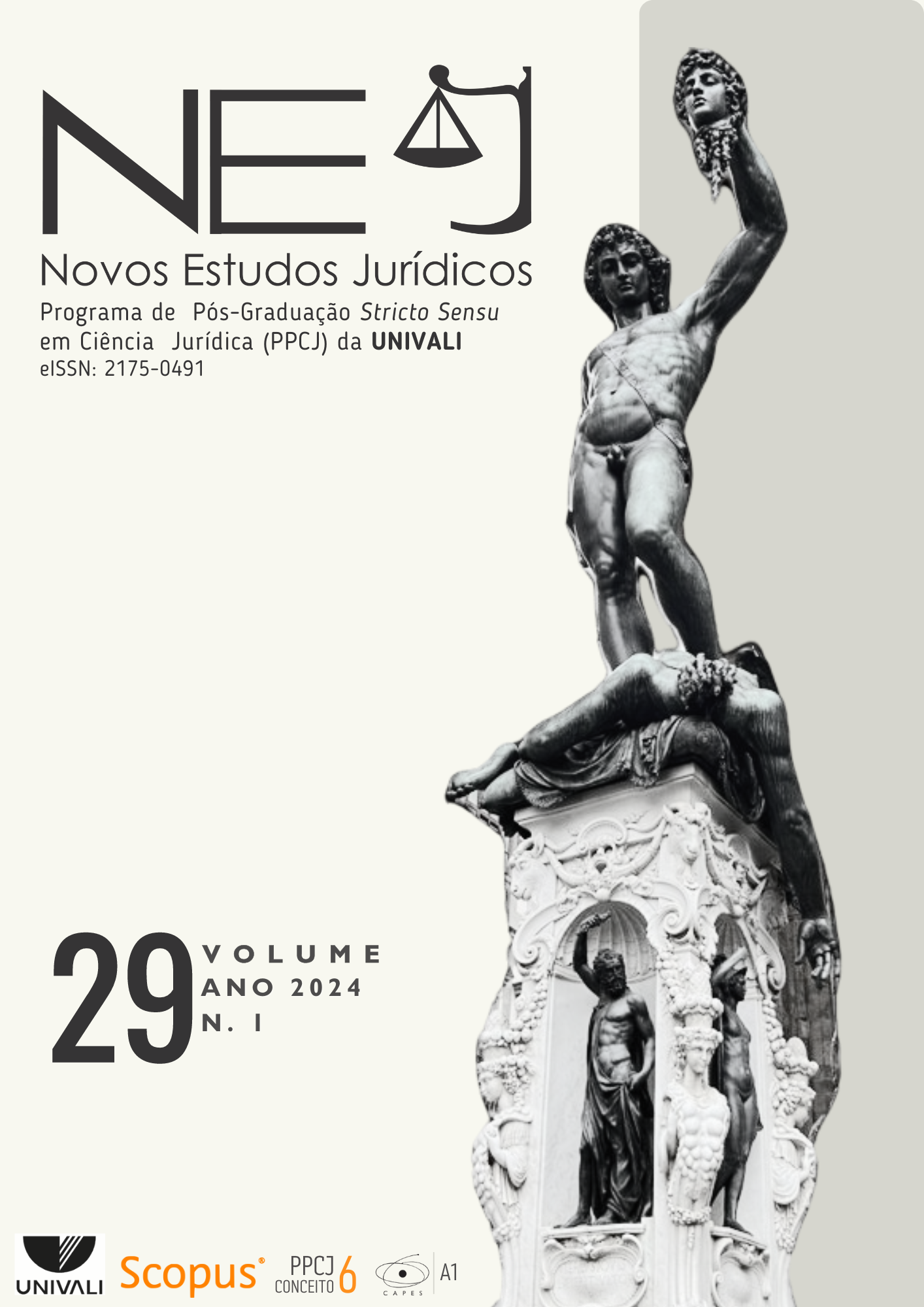CRITIQUE OF THE JUSPOSITIVIST THEORY OF JUDICIAL DECISION
DOI:
https://doi.org/10.14210/nej.v29n1.p100-123Keywords:
Judicial decision-making theory, Legal positivism, Fundamental rightsAbstract
Contextualization: The decision-making paradigm of legal positivism presents two distinct phases, which consist of the exegesis (or mechanistic) period and the normativist (or limited discretion) phase. However, throughout history, there was post-positivist development based on these theories, especially given the level of legal complexity of some cases, in which a considerable degree of judge discretion persists..
Objective: The objective of this article is to discuss the replacement or complementation of the juspositivist model of subsumptive visualization of the phenomenon of judicial decision, due to its excessive formalism, aiming to obtain a version with descriptive fidelity and, also, greater normative potential for the protection of rights fundamental.
Method: Regarding the methodology used, it is noteworthy that the inductive method was used in the research phase, the Cartesian method was used in the data processing phase and the final text was composed on a deductive logical basis.
Results: It was concluded that it is necessary to continue improving legal science, particularly with regard to the theory of judicial decision, overcoming formalistic constructions, in order to refine its descriptive and normative aspects, through the incorporation of recent interdisciplinary discoveries in the fields of economics and psychology, aiming to construct a theoretical paradigm that is more than positivist, and not less, while avoiding regressions to the previous theory of natural law.
Downloads
References
AGRA, Walber de Moura. Neoconstitucionalismo e superação do positivismo. In: DIMOULIS, Dimitri. DUARTE, Écio Oto. Teoria do direito neoconstitucional: superação ou reconstrução do positivismo jurídico. São Paulo: Método, 2008. p. 431-446.
ALEXY, Robert. Teoria dos direitos fundamentais. São Paulo: Malheiros, 2008.
ATIENZA, Manuel. El sentido del derecho. 6 ed. Barcelona: Ariel, 2010.
BOBBIO, Norberto. Jusnaturalismo e positivismo jurídico. São Paulo: Unesp, 2016.
BOBBIO, Norberto. O positivismo jurídico: lições de filosofia do direito. São Paulo: Ícone, 2006.
DWORKIN, Ronald. Justice for hedgehogs. Cambridge-MA: The Belknap Press of Harvard University Press, 2011.
DWORKIN, Ronald. Levando os direitos a sério. 2 ed. São Paulo: Martins Fontes, 2007.
DWORKIN, Ronald. O império do direito. São Paulo: Martins Fontes, 2007.
FERRAJOLI, Luigi. O constitucionalismo garantista e o estado de direito. In STRECK, Lenio Luiz. FERRAJOLI, Luigi. TRINDADE, André Karam (org.). Garantismo, Hermenêutica e (Neo)constitucionalismo. Porto Alegre: Do Advogado, 2012.
GRAU, Eros. O direito posto e o direito pressuposto. 7 ed. São Paulo: Malheiros, 2008.
HABERMAS, Jürgen. Direito e democracia: entre facticidade e validade. V 1. Rio de Janeiro: Tempo Brasileiro, 2003.
HART, H. L. A. Ensaios sobre teoria do direito e filosofia. Rio de Janeiro: Elsevier, 2010.
HART, H. L. A. O conceito de direito. São Paulo: Martins Fontes, 2009.
KELSEN, Hans. Teoria geral das normas. Porto Alegre: Sergio Antonio Fabris, 1986.
KELSEN, Hans. Teoria geral do direito e do Estado. 4 ed. São Paulo: Martins Fontes, 2005.
KELSEN, Hans. Teoria pura do direito. 7 ed. São Paulo: Martins Fontes, 2006.
PASOLD, Cesar Luiz. Metodologia da pesquisa jurídica: teoria e prática. 15 ed. São Paulo: Emais Editora, 2021.
PECES-BARBA, Gregorio. FERNÁNDEZ, Eusebio. ASÍS, Rafael de. Curso de teoría del derecho. 2 ed. Madrid: Marcial Pons, 2000.
POSNER, Richard Allen. A problemática da teoria moral e jurídica. São Paulo: Martins Fontes, 2012.
POSNER, Richard Allen. Para além do direito. São Paulo: Martins Fontes, 2009.
POSNER, Richard Allen. Problemas de filosofia do direito. São Paulo: Martins Fontes, 2007.
REALE, Miguel. Teoria tridimensional do direito. 5 ed. São Paulo: Saraiva, 1994. DOI: https://doi.org/10.11606/issn.2318-8235.v88i0p301-312
SANCHÍS, Luis Prieto. Apuntes de teoría del derecho. 5 ed. Madrid: Trotta, 2010.
ZANON JUNIOR, Orlando Luiz. Curso de filosofia jurídica. São Paulo: Tirant lo Blanch, 2019.
ZANON JUNIOR, Orlando Luiz. Teoria complexa do direito. 3 ed. São Paulo: Tirant lo Blanch, 2019. DOI: https://doi.org/10.17765/2176-9184.2019v19n3p825-852
Downloads
Published
How to Cite
Issue
Section
License
Na qualidade de autor(es) da colaboração, original e inédita, sobre o qual me(nos) responsabilizo(amos) civil e penalmente pelo seu conteúdo, após ter lido as diretrizes para autores, concordado(amos) plenamente com as Políticas Editorias da Revista Novos Estudos Jurídicos - NEJ e autorizo(amos) a publicação na rede mundial de computadores (Internet), permitindo, também, que sua linguagem possa ser reformulada, caso seja necessário, sem que me(nos) seja devido qualquer pagamento a título de direitos autorais, podendo qualquer interessado acessá-lo e/ou reproduzi-lo mediante download, desde que a reprodução e/ou publicação obedeçam as normas da ABNT e tenham a finalidade exclusiva de uso por quem a consulta a título de divulgação da produção acadêmico científico.





























